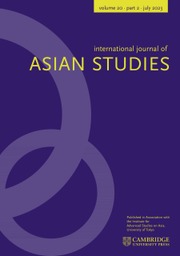Article contents
LAW, STATE AND SOCIETY IN CHINA [4]. THE NATURE OF SOCIAL AGREEMENTS (YUE) IN THE LEGAL ORDER OF MING AND QING CHINA (PART TWO)
Published online by Cambridge University Press: 16 January 2006
Abstract
In Part One, social agreements (yue) were introduced as a way of examining the relationship between private agreements/contracts and official law in Ming and Qing China. Their breadth and dynamic were illustrated through the analysis of three types of agreement: community agreements, village compacts, and rent-resistance compacts and alliances. Such agreements however were not simply voluntary contracts, for they also had a coercive aspect. Part Two first discusses the way coercion and voluntarism coexisted in social agreements, and emphasizes the importance of the fluctuating relationship between advocacy and response in this. It then looks at the role social agreements played in the local order, particularly at how official pronouncements were mediated by local customary practices, and suggests that both laws and contracts can be analysed in terms of advocacy and response. The validity of this approach may be further tested by applying it to the way pacts have been used in modern China, suggesting that it would be useful to look for the same issues here that have been discussed regarding social compacts in the Ming and Qing periods.
- Type
- LAW, STATE AND SOCIETY IN CHINA [4]
- Information
- Copyright
- Cambridge University Press 2006
- 1
- Cited by


